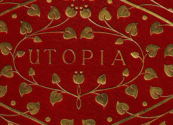Candide Discussion Questions
by Rachel Eckhardt
Pangloss
Consider Pangloss’s absolute commitment to his belief that this is the best of all possible worlds. He asserts this belief even at the very end of the novel, after all he has suffered: “… in the end, I remain a philosopher. It wouldn’t be right for me to disown myself; Leibniz cannot have been wrong; and our world’s pre-existent harmony, furthermore, is the loveliest thing there is…” (122).
I had been operating under the premise that Pangloss represents a commitment to Reason and the intellectual, but after rereading this quote I started to consider how irrational he is. Is Pangloss’s faith actually a spiritual and not intellectual belief? Is Pangloss attached to the contemplation of the beauty of perfection because otherwise the nature of God and the world would be too devastating? Or out of sheer loyalty to Leibniz? Is philosophy, in Voltaire’s view, just another, less violent, violent religious practice of asserting faith?
Utopia/Eldorado
Even as Candide comes up against example after example of reasons to question the notion that this is the best of all possible worlds, he also experiences Eldorado, a tiny isolated utopia where the gems and minerals are commonplace and everyone seems very content. Despite its peace and ease, Candide choses not to stay in Eldorado. Can we conclude from his decision to leave that even the seemingly perfect garden paradise is lacking something important, kind of like the way the initial paradise in Rasselas was unsatisfying? Or is he just anxious to spend all those coins?
The Old Woman
Can we consider the Old Woman the first voice of (actual) reason or is she just negative and pessimistic when she suggests that everyone will have their own miserable story? Both she and Pangloss (and everyone in the novel) experience physical suffering but her philosophical perspective is informed and shaped by the suffering of her body. Is there significance to her being a woman, tied into traditional concepts of femininity being more connected to the body?
Violence & Physical Trauma
There is so much violence that it is comical, excessive, and over the top. How does violence function to both lighten and darken the mood? What purpose do rape and loss of limbs serve when posed as light-hearted comedy?
Utopia/Garden/Retreat
At the conclusion, do self improvement and physical work, and refraining from theoretical thinking, represent a real utopia? Maybe we should be ignoring questions or just not answering them when they arise. It seems like a cute ending but can we consider it as an actual philosophical proposal based in the body and material reality over thinking too much?


